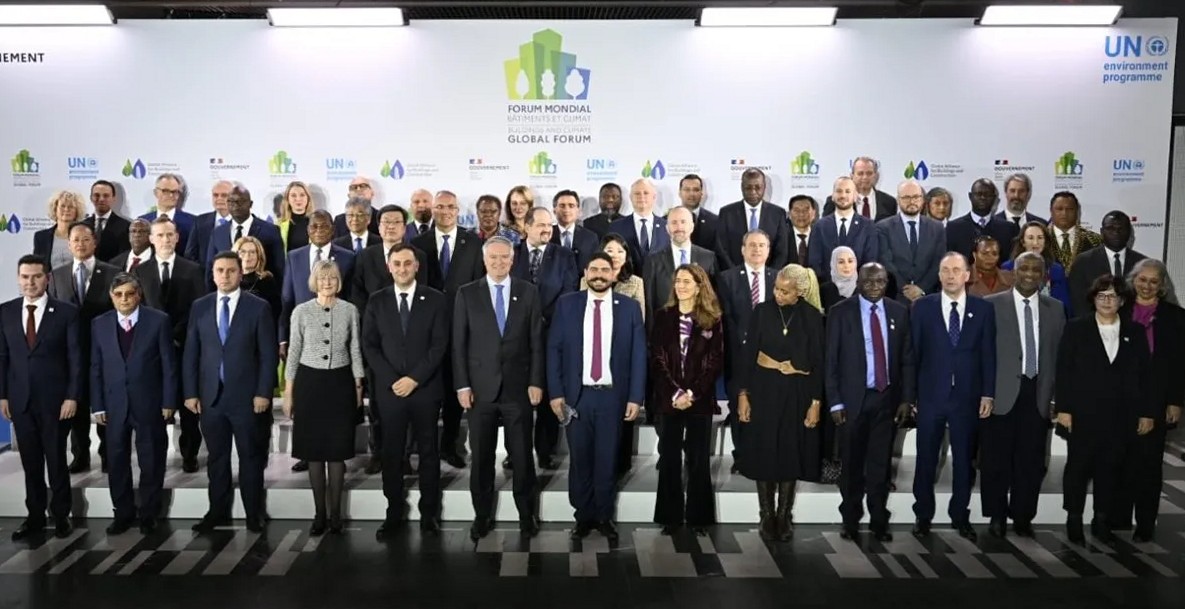70 countries agree to support the ‘rapid, fair and effective’ decarbonization of the buildings and construction sector
April 03, 2024

Representatives from 70 national governments have agreed to support the “rapid, fair and effective” decarbonization of the buildings and construction sector, according to a statement from the United Nations Environment Programme (UNEP).
The Déclaration de Chaillot, which was adopted at the first-ever Buildings and Climate Global Forum, represents a “decisive step” in the sector’s pathway to net-zero emissions, explained UNEP.
“In the face of the climate emergency, a swift transition of the buildings sector is a direct requirement to achieve the goals set by the Paris Agreement,” it added.
A declaration to decarbonize: According to organizers, the Déclaration de Chaillot is a “foundational document for international cooperation” across the building and construction sector’s entire value chain.
In signing the declaration, ministers have committed to a range of efforts, including:
- Implementing mandatory building and energy codes to move toward carbon-neutral buildings.
- Developing appropriate financial frameworks and regulatory tools, such as standards and labels, to increase the share of resilient, near-zero and affordable buildings.
- Promoting the research and development of “innovative solutions.”
- Adopting ambitious public procurement policies.
- Strengthening local know-how.
The newly-established Intergovernmental Council for Buildings and Climate, coordinated by the Global Alliance for Buildings and Construction (GlobalABC), will facilitate and monitor the implementation of the declaration’s goals.
Major emitters: According to the 2023 edition of the Global Status Report for Buildings and Construction, which was published by UNEP and GlobalABC at the Buildings and Climate Global Forum, the building sector is responsible for around 21% of global greenhouse gas emissions and 34% of global energy demand.
- To meet the goals set out in the Paris Agreement, the sector must cut energy and fossil fuel consumption in buildings by 25% and 40%, respectively, by 2030 as compared to 2022.
- To mobilize action and collaboration in support of the decarbonization and resilience of buildings, the Buildings and Climate Global Forum brought together ministers and high-level representatives from key organizations.
- More than 1,400 participants attended the summit, which was hosted by the French government and UNEP in Paris, March 7–8.
What it means for NatRefs: As countries work to decarbonize their building stock, passive design and the energy efficiency of HVAC systems will be a major focus – as should the choice of refrigerants.
- Space cooling – i.e., air conditioners and electric fans – currently consumes around 20% of the total electricity used in buildings and is a main driver of rising global electricity demand. With around one-third of cooling-related emissions coming from refrigerants, transitioning to natural refrigerants would have a sizable impact on emissions.
- As nearly 50% of the energy used in buildings worldwide goes towards space heating and hot water production, heat pumps will be key for reducing the energy consumption and greenhouse gas emissions of buildings. The climate impact of heat pumps can be reduced further by opting for natural refrigerant-based technologies.
What the UN says: “The Déclaration de Chaillot will boost cooperation and strengthen the implementation of local, national and international climate action in the buildings and construction sector to support the goals of the Paris Agreement,” said Ligia Noronha, UN Assistant Secretary-General and Head of UNEP’s New York Office. “The next round of National Determined Contributions, to be submitted by early 2025, will offer a great opportunity to move from ambition to action and accelerate the transformation we need.”


